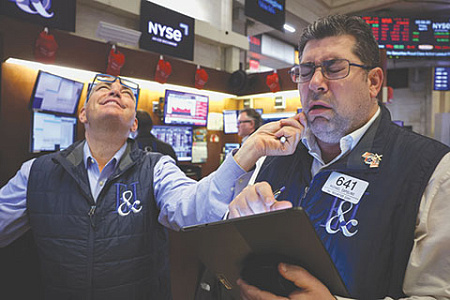
Donald Trump’s imposition of tariffs on goods from most countries around the world has sent stock markets tumbling and alarmed US allies. EU trade ministers discussed the current situation on Monday, April 7. Italian Prime Minister Giorgia Meloni wants to assume the role of a peacemaker capable of reaching an agreement with Trump. The American president himself declares that he will not cancel duties until the US trade deficit with the EU, China and other countries disappears.
The week opened with a drop in stock indexes, including those on the New York Stock Exchange. The Dow Jones dropped by 3.12%, the S&P – by 3.39%, and the Nasdaq electronic exchange – by 3.93%. The situation in the European stock markets is no better. In London, the FTSE 100 index lost over 5% at the start of trading. Prices are falling in China, in particular on the Shanghai Stock Exchange. The indices of European defense companies are also falling, seemingly overwhelmed with orders due to the conflict between Russia and Ukraine. Rheinmetall AG’s shares fell by 27%. This, according to Bloomberg, was the sharpest one-day drop in history.
Exchanges have been in a fever since April 2, when Trump imposed duties on goods from 185 countries. He became a very unusual Republican president. When representatives of this party take office, stock indexes usually begin to grow, which sometimes continues for at least the first 100 days of the government. The opposite happens under Trump.
The American president claims that nothing terrible is actually happening. “I don’t want anything to fall. But sometimes you have to take medicine to fix something,” he said, speaking to reporters aboard his plane. There, Trump outlined the conditions under which he would agree to cancel duties, at least for EU countries. The Europeans, as the president put it, should “pay us a lot of money every year, first for the present, then for the past,” until the trade deficit with them disappears.
“We buy their cars, we buy millions of their cars. But they don’t take any of our cars. They don’t buy our agricultural products. They don’t buy anything. Europe is behaving very, very badly with us,” Trump said. In fact, he said the same thing about China.
The comments that European officials and stock market analysts give on the situation are different. But it is significant that there is already a panic mood. The Guardian quotes Poland’s Deputy economy minister Michal Baranowski. He compares the current situation with that of the 1930s. Then the crisis that followed the collapse on the New York Stock Exchange (it began with the infamous “Black Thursday” on October 24, 1929) was aggravated by a tariff war between developed countries that tried to protect their markets with high duties. All this eventually led to the Great Depression, the collapse of democracies in many countries, and the establishment of far–right dictatorships in Europe, one of which was the Nazi regime in Germany. By the way, the tariff war had little effect on the USSR. The country had its own tragedy: collectivization, which culminated in the famine of 1932-1933, which claimed millions of lives – something that neither Europe nor the United States, despite the crisis, had come close to. Baranovsky expressed the hope that negotiations with Trump will be able to begin as soon as possible. Otherwise, the deputy minister warned, “there will be no winners in this confrontation.”
Fearing that things will indeed come to a repeat of the scenario of almost a century ago, the EU is in no hurry to respond to Trump. European Commissioner for Trade Maros Sefcovic held a meeting with EU trade ministers in Brussels on Monday. In his opening remarks, he warned that a decision on retaliatory actions against US duties would not be taken immediately, but two days later. Sefcovic said that the list of countermeasures discussed by the ministers would be sent to all EU countries on Monday. Voting on them will take place on April 9, and the final list of tariffs will be ready by April 15. “Duties (on American goods. – “NG”) will enter on this day for priority countermeasures, and for the rest – on May 15,” he said. The EU apparently decided to leave time for diplomacy, so it did not rush headlong to introduce counter-sanctions as soon as possible. Commendable restraint, considering the damage caused by Trump’s actions. Sefcovic cited impressive figures in his speech: together with the duties already in force, Europeans have to pay the Americans 80 billion euros more for their goods. “This is an eleven–fold jump compared to the 7 billion euros currently collected by the United States,” the European commissioner said.
The EU has not yet planned to involve any international structures in the trade confrontation with Trump. So far, only Canada has applied to the World Trade Organization from Western countries. In Europe, they rely on bilateral agreements. According to the Italian newspaper Il Foglio, Meloni is going to take on the role of Trump’s main persuader. She is listed among the supporters of the American president, almost his main ally in the EU. Meloni’s visit to the United States is scheduled for April 16, the day after the final list of European countermeasures is ready.
